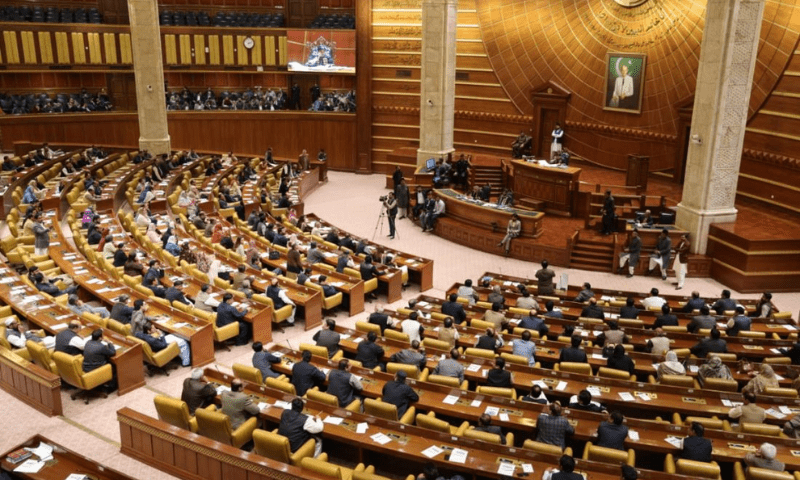On Friday, the ruling coalition in Punjab, led by PML-N, suffered a setback as the speaker suspended 24 women and three minority MPAs from joining the provincial assembly’s proceedings, resulting in the loss of dozens of reserved seats.
Of the suspended MPAs, 23 were affiliated with PML-N, two with PPP, and one each with PML-Q and IPP.
Speaker Malik Mohammad Ahmed Khan made this decision in response to a point of order raised by opposition lawmaker Rana Aftab of PTI-backed Sunni Ittehad Council (SIC) during the previous day’s house proceedings.
Rana Aftab argued that the Supreme Court had suspended the Election Commission of Pakistan’s decision to allocate reserved seats of SIC to other parties, citing that SIC hadn’t contested elections or submitted a list of nominees for the reserved seats.
Speaker Khan announced that he had sought opinions from the advocate general and the provincial law department and would make a decision based on their reports.
During Friday’s house proceedings, the speaker referenced the Supreme Court order, declaring Rana Aftab’s point of order legitimate and immediately suspending the 27 members.
When Mr. Aftab highlighted that the suspended MPAs had unlawfully voted for the resolution condemning the violence on May 9, the chair retorted that he should have raised the issue when the resolution was put to vote the previous day.
The suspended women MPAs include Maqsoodan Bibi, Rubina Nazir, Salma Zahid, Kanwal Nauman, Zeba Ghafoor, Saeeda Samreen Taj, Sheharbano, Amna Parveen, Syed Sumera Ahmed, Uzma Butt, Afshan Hussain, Shagufta Faisal, Nasreen Riaz, Sajida Naveed, Farzana Abbas, Mariya Talal, Tasheen Fawad, Abida Bashir, Saeeda Muzaffar, Faiza Monima, Amera Khan, Samiya Ata, Rahat Afza, and Rukhsana Shafiq.
The minority MPAs affected were Tariq Masih Gill, Waseem Anjum, and Basroji.
National Assembly
After the Supreme Court’s ruling and subsequent actions by the Punjab Assembly speaker, the ruling coalition in the National Assembly is poised to lose nearly two dozen members before the crucial budget session. President Asif Ali Zardari has called for a National Assembly session on Monday, with SIC members expected to pursue a similar ruling from Speaker Ayaz Sadiq.
The Election Commission of Pakistan initially withheld notifications on 23 reserved seats in the NA, sparking a dispute over allocation after PTI-backed independents joined the SIC. Eventually, the ECP distributed these seats to parties in the ruling coalition, notably the PML-N. Consequently, the PML-N became the largest party in the NA.
In Punjab, the PML-N’s tally also increased significantly due to reserved seat allocations, solidifying its position. Similarly, the PPP’s representation increased, though still fewer than PTI-backed independents aligned with the SIC. The composition of the Balochistan Assembly remains unaffected, but in Sindh, PPP gained two reserved seats from the PTI-SIC share.
KP Assembly
In the Khyber Pakhtunkhwa Assembly, a notable disparity in reserved seat distribution occurred despite PTI-backed independents securing 91 seats compared to the combined 19 seats won by other parties. The JUI-F, with only seven general seats, was allocated 10 reserved seats for women.
Similarly, the PML-N, with six general seats, received eight reserved seats, while the PPP, with four general seats, was allocated six reserved seats. Even parties like the ANP and PTI-P, with just one general seat each, saw their representation double in the provincial assembly. However, these KP Assembly members have yet to take oath as the speaker has not called the session.
In another development, the Punjab Assembly adopted a resolution during its Friday sitting, condemning the recent killing of 11 workers from Punjab in Gwadar. The resolution, presented by treasury members, called on the federal government to apprehend the perpetrators and provide compensation to the victims’ families.
Additionally, during the session, Punjab Finance Minister Mujtaba Shuja addressed concerns about the south Punjab secretariat, stating that it was not being dissolved but rather undergoing changes in leadership due to promotions.
He refuted claims that the PML-N was against south Punjab’s development, citing the region’s progress during Prime Minister Shehbaz Sharif’s tenure as Punjab’s chief minister.










